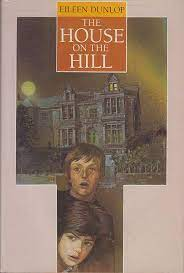Author: Eileen Dunlop
Publication: Holiday House, hardcover, 1987
Genre: Juvenile fantasy
Setting: Glasgow
Description: Philip has always heard that his great-aunt Jane is proud and unfriendly, and although she lives just a mile away in suburban Glasgow, he barely knows her. But after his father dies, his mother decides to train as a nurse in London and asks her aunt if Philip can stay with her at The Mount, the family mansion on Wisteria Avenue. His first cousin Susan, about his age, already lives with Aunt Jane, having been sent from Kenya to attend school. Philip is prepared to dislike them both but slowly realizes that Jane is quiet rather than snobbish and he and Susan become allies when they realize both can see a disquieting light in a room that has been dark and empty for years. Despite their fear of the haunted room, Philip and Susan are determined to dig into the past to solve the family secrets hidden in the old house.
My Impression: I think Fen Crosbie recommended this not only because Dunlop is a skilled writer but also because it portrays Glasgow so vividly. The Mount is the last house on Wisteria Avenue that has not been turned into flats. Contrary to Philip’s belief, the family money is long gone and Aunt Jane is forced to sell her furnishings to cover her expenses. The garden is overgrown and obscures the house. Developers are interested but something prevents Jane from giving in and selling. And less than a mile away is the tidy little house Philip usually lives in with his mother, which he takes for granted but Susan yearns for its convenience. And in Philip’s home are two items his mother must have brought with her from The Mount, her grandfather’s desk and an inlaid box in which he kept special papers.
Susan explains to Philip (who is almost as disagreeable as Eustace Scrubb in the first third of the book) that Jane was forced to leave university when her mother died to keep house for her father. Later, her fiancée died at Dunkirk, and she remained home to be bullied by her father until he died. Learning about Jane’s misfortune forces Philip to start thinking empathetically about someone else and is the beginning of his evolution into a nicer boy; he also realizes that his father had a chip on his shoulder about being disapproved of by the Gilmore family. But he and Susan have a mystery to solve – why is the light always on in the bedroom that belonged to their great-grandfather William Gilmore?
“Listen, Philip. I’ll have to finish my homework now, or there’ll be hell to pay tomorrow. But before you go – what are we going to do about that queer room downstairs?”The growing friendship between Philip and Susan, his increasing affection for his quiet aunt, his determination to make his mother understand that she was wrong about Jane’s standoffishness, and the mystery all make this book appealing. It takes courage to visit the haunted room but once the children guess that their great-grandfather was instrumental in destroying Jane’s happiness they are determined to learn the secret he tried to hide. Philip is a much kinder and more mature person at the end, having earned Susan and Jane’s friendship.
Philip was pleased, afterwards, that he had risen immediately to the challenge.
“Investigate,” he replied firmly. “Tomorrow, after school.”
“Great,” said Susan, well satisfied. “There’s no hockey so I’ll be home early.”
Source: Library. I own three of Dunlop’s books and they are all worth reading, should your library have them. I had never come across this one and had to request it from Interlibrary Loan. Here is Pining from the West's review of Robinsheugh, a timeslip published in the US as Elizabeth Elizabeth.


3 comments:
Pretty sure I weeded this from my library years ago. I think once the cabinet where I save the books I can't bear to part with but can't leave on the shelf is full, I will have to retire! Have to continuallyk tell myself "I do not run an archive!" Sigh
I can imagine! I sometimes feel I *am* an archive. I would donate some of my rare books to the Boston Athenaeum but when I went on a tour there once and spoke to a children's librarian she told me many of their children's books had been stolen. Admittedly, a determined thief can probably find a way but that is not what a prospective donor wants to hear!
Given how scarce Dunlop's books are in the US, I was surprised to see this was published by Holiday House and there appears to have been a Troll Book Club paperback
This sounds good, especially the part of about portraying Glasgow so well. I had to look up Eustace Scrubb.
Post a Comment